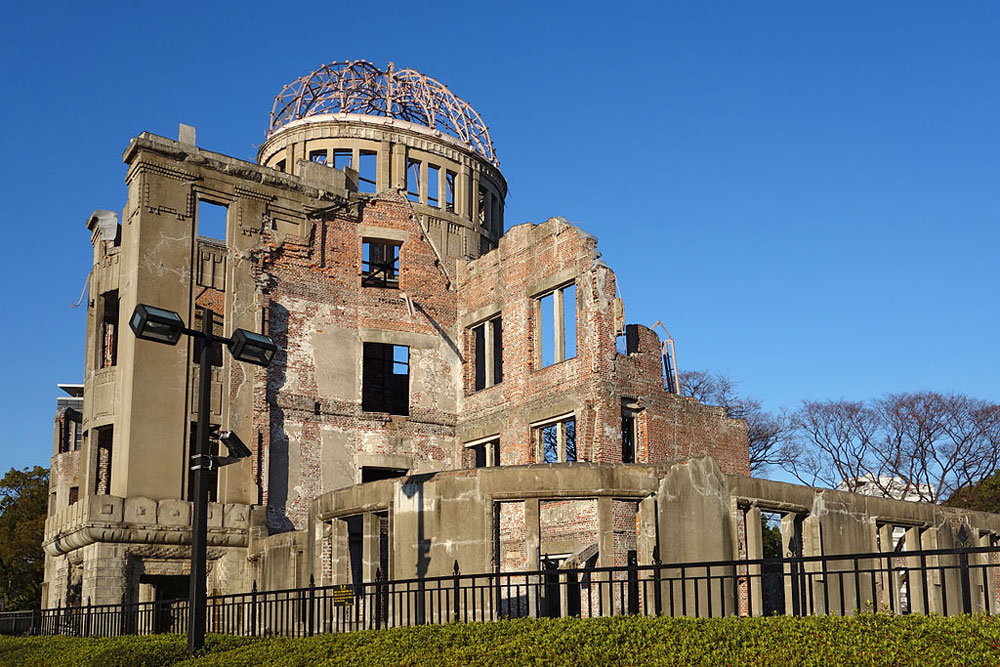
It was 75 years ago today, on August 6, 1945, that an atomic bomb was dropped over Hiroshima, Japan. According to the Bulletin of the Atomic Scientists, the US military said 70,000 perished, mostly civilians, either the day of the bombing or within months from radiation. Later independent estimates contend 140,000 died. Three days later, Nagasaki was also bombed. Again, there is a discrepancy in the numbers: the US Army said 40,000 had died, while independent sources estimate 70,000 deaths.
With the use of atomic weapons, a new era—the atomic age—had begun. Soon, the world would divide politically into two camps, one led by the United States, and the other by the Soviet Union—centered, of course, in Russia. The Cold War, which would last until the dissolution of the Soviet Union in 1991, was underway.
In remembrance of these world-shaping events, NPQ senior editor Steve Dubb interviewed Gar Alperovitz—historian, political economist, and the author of Atomic Diplomacy–Hiroshima and Potsdam: The Use of the Atomic Bomb and the American Confrontation with Soviet Power (1965) and The Decision to Use the Atomic Bomb (1995).
In 1965, to publicly suggest that the dropping of the atomic bomb was more about US positioning in the coming Cold War than the military goal of defeating Japan in World War II was tantamount to apostasy in US circles. A scathing New York Times review written shortly after the book was published said that for Alperovitz to be correct, one would have to believe that US leaders “were not truthful in their accounts of the decision to use the bomb”—a contention considered shocking then, even if we’ve since come to expect such lies from leaders.
As Alperovitz’s research has found, many military leaders said the dropping of the bomb was not needed to end the war. Admiral William Leahy, Chief of Staff at the time, said, “[T]he use of this barbarous weapon at Hiroshima and Nagasaki was of no material assistance in our war against Japan.” Pacific Fleet Admiral Chester W. Nimitz, in a public address at the Washington Monument two months after the bombings, stated, “The atomic bomb played no decisive part, from a purely military standpoint, in the defeat of Japan.” Former President Dwight Eisenhower said simply in a 1963 interview, “It wasn’t necessary to hit them with that awful thing.” Even famed hawk Major General Curtis LeMay said at a press conference in September 1945 that dropping the bomb “had nothing to do with the end of the war.”
Sign up for our free newsletters
Subscribe to NPQ's newsletters to have our top stories delivered directly to your inbox.
By signing up, you agree to our privacy policy and terms of use, and to receive messages from NPQ and our partners.
Three-quarters of a century have passed since that terrible day. Today, there are thousands of nuclear weapons, but we do not think about them often. But maybe we should. In this interview, Alperovitz discusses:
- How the end of World War II was celebrated in the US in 1945
- The mindset of US leaders at the end of World War II and the resulting tragedy of US diplomacy
- How the dehumanization of “the enemy” fosters the brutality of war
- How imperialism develops a momentum of its own that is difficult to stop
- How public decision-making can amplify key voices (such as Secretary of State James Byrnes during the Truman administration or Vice President Dick Cheney in the George W. Bush administration), with terrifying consequences
- The important role of social movements both in stopping the arms race during the Cold War and in the pursuit of racial justice and climate justice now
- Why we must still fear the bomb—and need a new peace movement today
Resources
Gar Alperovitz, “The History of the Decision to Use the Atomic Bomb.” [author website].
Gar Alperovitz, “The War Was Won Before Hiroshima—And the Generals Who Dropped the Bomb Knew It,” The Nation, August 6, 2015.
Alexander Cockburn, “Gar Alperovitz, “Unjust Cause: Historian Gar Alperovitz on the decision to bomb Hiroshima and Nagasaki,” Harper’s, May 25, 2016.
Rick Cohen, “Atomic Veterans Advocate Acie Byrd Dies,” NPQ, June 16, 2014.












